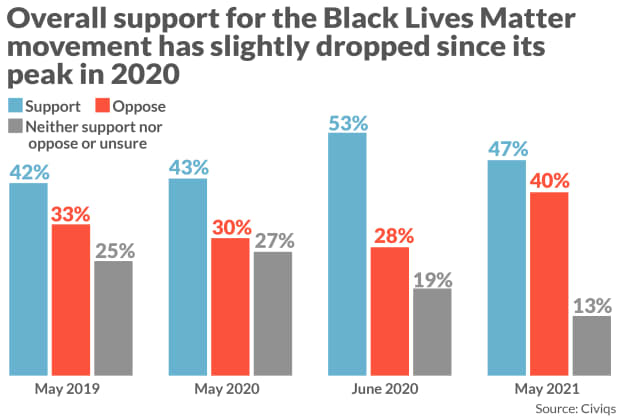This post was originally published on this site
It’s been one year since unarmed Black man George Floyd was murdered by former police officer Derek Chauvin in Minneapolis.
In the wake of Floyd’s death, protesters across the U.S. showed displeasure about another Black man being killed by law enforcement. The Black Lives Matter organization, which started in 2013, grew more popular among Americans in the weeks after Floyd’s death.
In May 2019, one calendar year before George Floyd’s murder, support for the Black Lives Matter movement was 42%, according to Civiqs tracking data. Support then jumped to 53% in the weeks following Floyd’s death.

In the survey, 244,378 registered voters answered the question: “Do you support or oppose the Black Lives Matter movement?”
Support for BLM is up over the past two years, but the momentum has dipped since its peak in June 2020, a few weeks after Floyd’s death.
Additionally, more people now say they “oppose” the movement.
It’s not uncommon for certain issues to get short-lived bumps after momentous events.
For example, there is historical data to suggest that Americans’ demand for gun control legislation typically spikes after a mass shooting, before settling back to near pre-event levels.
And other polls suggest that Americans do not believe race relations are improving.
According to a recent Morning Consult/Politico poll, 46% of Americans say race relations have gotten worse over the past five years, and just 30% of respondents anticipate they will be better five years from now.
President Joe Biden has invited George Floyd’s mother, siblings and other family members to a private ceremony at the White House on Tuesday — White House press secretary Jen Psaki said Biden is “eager to listen” to the family’s thoughts on the issue of police reform.

